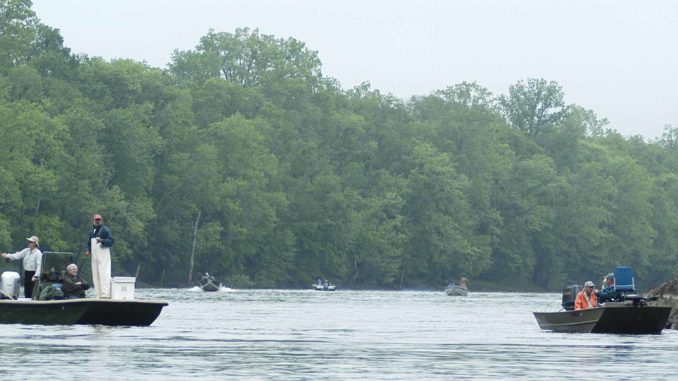
Mining site lies in Roanoke River watershed; environmental groups throw up red flags
Environmentalists and the Roanoke River Basin Association are worried Virginia may allow mining for uranium in Pittsylvania County and possibly contaminate one of the major river drainages that flows into northeastern North Carolina.
Striped bass, largemouth bass, smallmouths, panfishes, catfish, crawfishes and billions of invertebrates lower on the food chain live in the Roanoke River’s flowing waters. Fishing supports thousand of jobs and several shoreline towns pull drinking water from the river.
Virginia Uranium, Inc., wants a 30-year moratorium on uranium mining in the state lifted, starting with the world’s richest untouched deposit — estimated at 59,500 tons, worth $7 billion worth — between Chatham and Gretna at Coles Hill Farm. Walter Hill, owner of Coles Hill farm, is president of Virginia Uranium, Inc.
“The problem is, (Virginia) state law didn’t actually ‘ban’ uranium mining,” said Taylor Pool of the Duke Environmental Law Center, which has been studying the situation for environmental groups. “What the law said was no mining could be done until after the state legislature authorized a study.”
That moratorium was initiated in the 1980s after discovery of huge uranium deposits in Pittsylvania County, but no legislation was finalized.
Current mining proponents must deal with a dearth of public knowledge about uranium. Most people know uranium was involved in three memorable and scary breakdowns: Three Mile Island; Chernobyl, Russia; and last year’s Fukushima, Japan, disaster.
Raw-mined uranium has little radioactivity until it is altered during the process that converts the ore to isotopes, U-238 and U-239 being the best-known. Naturally-occurring uranium rocks dot the landscape at Coles Mill Farm and have caused no problems.
“We’re fighting ‘The Simpsons,’” said Patrick Wales, project manager for Virginia Uranium. “Most Americans know everything they do about the nuclear industry from Homer Sipson (the clueless cartoon character who threw a stray piece of nuclear waste out his car window into the street). All things nuclear are not the same, That rock sitting there) is not the same as spent fuel that comes out of a reactor because, if it was, we would all have been done in by now.”
The problem, Pool said, is mining of uranium produces tons of waste products (tailings) that have to be stored above or under ground. Underground wastes, unless sealed, can leach into ground water.
“It also produces radon gas, which is dangerous to humans, and if uranium gets into drinking water, it accumulates in the kidneys and eventually shuts them down,” he said. “(Virginia Uranium, Inc.) also hasn’t said how they plan to store the wastes — above or below ground.
“The main concern in Virginia is that it’s very wet,” Pool said. “It’s a temperate climate and has rolling hills, so contamination (after rain events) would be guaranteed.”
Pool said the Banister River, a tributary of the Roanoke River, is two miles from Coles Mill Farm, and two other tributaries, Mill Creek and White Horn Creek, are nearby.
Virginia’s legislature also hasn’t opened the process to public comment.
“Their uranium working group isn’t subject to public-access laws through the (Freedom of Information Act),” Pool said. “They’re going to hold four public meetings, but we’ve heard they won’t allow public comments. One they held was basically to give everyone handouts to let people know what the process was and what they’d done.”
Another meeting is set June 3 at Chatham, Va.
Pool said if Virginia allows mining, the Commonwealth will receive the economic benefits while the Tar Heel State will receive nothing more than contaminated runoff, and a go-ahead decision also will set a precedent and open other areas to uranium mining.
The debate will continue another year. During January 2012, Virginia Gov. Bob McDonnell ordered the state study of the mine site to be completed before the 2013 General Assembly.




Be the first to comment